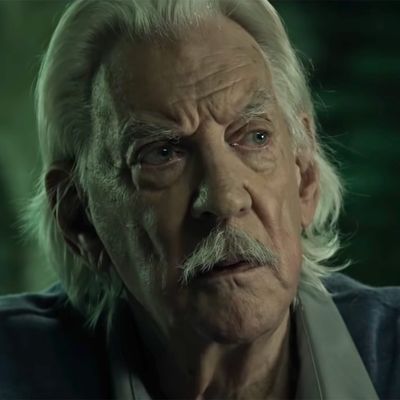
American Hangman is college-level death penalty discourse, appropriately armed with what appears to be a college-level production budget. By “college-level discourse,” I mean something fairly specific: there’s a working understanding of the intricacies and contradictions and consequences of an issue as morally complex as the death penalty, but it’s not yet a ripened understanding, and the nuts and bolts are still new ideas being played with, divorced from any human interest (or, usually, any real human experience). It’s the kind of thing anti-fans of Black Mirror accuse our modern-day Twilight Zone of dealing in, but I think there’s plenty of proof that Charlie Brooker can have a heart when he wants to. American Hangman, a bar thought experiment turned into a film every bit as simple and bad-taste-leaving as that would imply, only has use for humans as sock puppets.
Its premise does resemble the notorious first episode of Brooker’s show, at least at the outset. Two men are brought into a grimy basement in an undisclosed location, where a brooding young man (Vincent Kartheiser) has brought them before a set of live-streaming cameras for a trial of sorts. Ron (Paul Braunstein) is promptly handcuffed, hooded, and tased, while the other man (Donald Sutherland) is placed behind a mock witness stand to watch him suffer. It takes over 30 minutes of this miserable, familiar scenario (the Saw comparisons are not just suggested but spoken out loud) before Ron is unceremoniously offed by his captor and the real nature of the livestream is revealed: trying Sutherland’s retired judge for having sentenced the wrong man to death for the kidnapping and murder of a young girl. Kartheiser is the prosecutor, and the growing online audience is the judge.
American Hangman is basically the “yet you choose to participate in society — curious!” of movies. We periodically flash to a bar where nameless average Joes and Janes eat crispy chicken sandwiches and drink white wine while watching the trial unfold on their phones and TVs. When Kartheiser begins polling the streaming audience to determine whether to uphold objections or, say, sentence Judge Straight to death, they dutifully chime in on social media, and seem to be curious at worst about what is obviously going to turn into a livestreamed snuff tape. Meanwhile, a hacker who appears to be working out at a yoga retreat, an ambitious anchor at USCN Cable News, and the team at Metro Police (this is the kind of movie where phrases like “the state” and “Triboro area” are thrown around so as to avoid naming a specific setting — making the drama even more vague and hollow) crack open the cold case of the girl’s murder, and try to figure out where the livestream is coming from.
There is potentially a way to execute the concept of this film without coming off like a freshman-year philosophy student, home for winter break, yelling at his parents about determinism. But in all its wide swath of players, writer-director Wilson Coneybeare has placed the guy executing people on camera more or less at the top of the enlightenment hierarchy — and that’s a problem! In this wannabe-incisive indictment of “trial by social media” and how justice itself is shaped by media narratives and groupthink, Kartheiser’s character seems to sit outside those dynamics, where he is able to see the world for what it really is, man. But what creates a murderous introvert with a penchant for online showboating and #disruption? Isn’t he also a product of all the things he condemns? Coneybeare doesn’t seem interested in this question — even though he is “bad” and “a murderer,” the film seems to imply he has the most clear-eyed view of society.
As for the mystifying involvement of its two leads, Sutherland plays sad and doddering well enough, but one can never quite believe the sophomoric dialogue coming out of his mouth. Kartheiser, on the other hand — what made Mad Men’s Pete Campbell a compelling character was the sense that he was one trust-fund deposit away from being a basement-dwelling creep. He may have had a comparable suit budget to his colleagues, but his hairline betrayed him and a deeper anxiety rotting away at his core. Of the show’s core cast, he certainly would have been the most likely to murder someone. But there’s a certain deflating effect to casting Kartheiser as an actual basement-dwelling creep — greasing his hair and combing it down over his eyebrows, outfitting him with the khakis and glasses de rigueur for your average tiki-torch wielder. Kartheiser is quite good at playing someone with enough unearned braggadocio to not realize how mismanaged his priorities are. He’s not someone you want in charge of your film’s galaxy brain.




